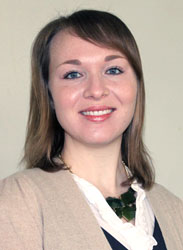Twelve Years in the Making: Outreach Coordinator Earns Architecture License
Sara Martin, Outreach Coordinator for Smart Trips, recently became a registered architect after 12 years of education, internship, and testing.

The achievement fulfills a longstanding professional goal of Martin's and delivers unexpected benefits for her work in alternative transportation.
Martin moved to Knoxville from her hometown of Chattanooga in 2000 to attend architecture school at the University of Tennessee. "I wasn't one of those high school graduates who knew exactly what I wanted to do with my life," says Martin. "I had an interest in design and wanted a career that would allow me to improve the place I live -- the built environment."
Martin was amazed at the range of the education. Architecture school teaches design at every scale -- from a single room to an entire city plan.
UT's program is the only one in the state accredited by the National Architecture Accrediting Board (NAAB). Graduation from an accredited program is a prerequisite for licensure. The other two requirements are completion of a three-year Intern Development Program (IDP) and a seven-part licensing exam.
Before coming to work for Planning, Martin spent nine years working for local architecture firm Ross/Fowler. "My experience at Ross/Fowler was invaluable. They gave me opportunities to learn everything from schematic design to construction administration so I could satisfy the diverse requirements of IDP. Under their mentorship, I became interested in urban design which influenced my decision to work for Planning."
In her current role as Outreach Coordinator for Smart Trips, Martin advocates alternative modes of transportation, including walking, biking, and using transit. Her background in architecture and urban design helps her understand the broader context of transportation issues. "It's unrealistic to ask people to walk and bike more if there are no safe, connected routes where they live. Alternative transportation is, in part, a design issue," says Martin.
Participation in the Smart Trips program has grown steadily since it began 10 years ago. Each year, more East Tennessee commuters choose alternative modes over driving alone to work. According to Martin, focusing on walkable, bikeable communities will encourage even greater participation. She looks forward to using her newly earned credentials to strengthen the connection between alternative transportation and the built environment.